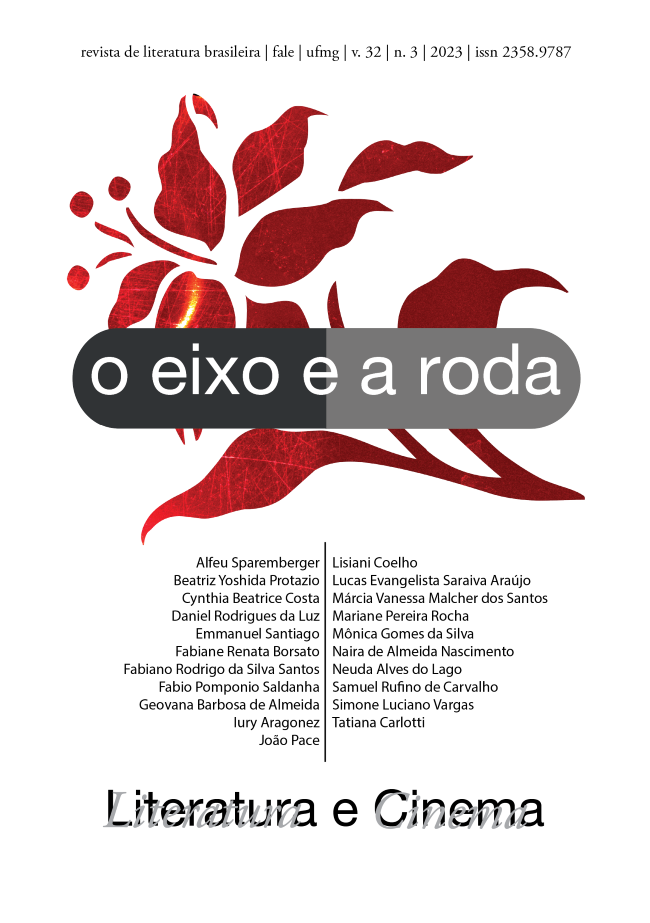A weird tea and other animals
“Tigrela”, by Lygia Fagundes Telles, and the Critical Animal Studies
DOI:
https://doi.org/10.17851/2358-9787.32.3.305-323Keywords:
Tigrela, Lygia Fagundes Telles, Critical Animal Studies, Gabriel Giorgi, Julieta YelinAbstract
Usually connoted to the Fantastic genre, a part of Lygia Fagundes Telles’ short stories can, however, be reread from the perspective of Critical Animal Studies. The recent passing of the writer, also culminating in initiatives such as the one from Companhia das Letras, with the full publication of her short stories (2018), leads to a resumption of her work. The animal turnover, starting point of the lead reflections, take precedence, first, for questioning the centrality granted to the human animal, particularly in the Western culture and specially since Modern times. The Antrhopocene Epoch is characterized precisely by this authoritarian imposition of human needs and desires in the face of rights arising from other forms of life. The analysis of the short story “Tigrela”, of Seminário dos ratos (1977), intends to observe meanings beyond the mere animalization contained in the evocation of the protagonist and to perceive in Lygia’s writing a game between the figurations of non-metaphorical animals (FERRREIRA, 2005), which is close to some creations of João Guimarães Rosa and Clarice Lispector. Read today by Critical Animal Studies, both Rosa’s and Clarice’s texts elucidate a possible and even desired relation between human and non-human animals, based on an awareness of the subaltern role played by the non-human beings in our imagination. The reading of the text has also the theoretical foundation based on the concept of becoming (DELEUZE; GUATTARI, 2012) and the apprehensions of female anti-speciesism, in addition to the critical considerations of Gabriel Giorgi and Julieta Yelin.
Downloads
References
BERGER, John. Por qué miramos a los animales. Mirar. Buenos Aires: Ediciones de La Flor, 1999.
BORGES, Jorge Luis. O aleph. São Paulo: Companhia das Letras, 2008.
DELEUZE, Gilles; GUATTARI, Félix. Mil platôs. v.4. São Paulo: Editora 34, 2012. (Coleção Trans)
FARIA, Catia. Lo personal es político: feminismo y antiespecismo. Revista Latinoamericana de Estudios Críticos Animales, ano 3, v. 2, p. 20-38, dez. 2016.
FERREIRA, Ermelinda. Metáfora animal: a representação do outro na literatura. Estudos de literatura brasileira contemporânea, Brasília, n. 26, p. 119-135, jul./dez. 2005.
GIORGI, Gabriel. La rebelión de los animales: zoopolíticas sudamericanas. Aletria, Belo Horizonte, v. 21, n. 3, p. 165-177, set./dez. 2011.
GIORGI, Gabriel. Formas comuns: animalidade, literatura, biopolítica. Tradução Carlos Nougué. Rio de Janeiro: Rocco, 2016. (Coleção Entrecríticas)
HARAWAY, Donna. Simians, Cyborgs and Women: The reinvention of Nature. Londres: Free Association Books, 1991.
JAVAREZ, Jeanine Geraldo. O animal que me tornei: metamorfose e animalidade como teorização do conceito de identidade no romance lygiano. 2017. Dissertação (Mestrado em Estudos da Linguagem) – Universidade Estadual de Ponta Grossa, Ponta Grossa, 2017.
LESTEL, Dominique. A animalidade, o humano e as comunidades híbridas. In: MACIEL, Maria Esther (org.). Pensar/escrever o animal. Ensaios de zoopoética e biopolítica. Florianópolis: Editora da UFSC, 2011. p. 23-53.
LISPECTOR, Clarice. Onde estivestes de noite. Rio de Janeiro: Rocco, 2020.
MACIEL, Maria Esther. Literatura e animalidade. Rio de Janeiro: Civilização Brasileira, 2016. (Coleção Contemporânea)
MARROQUÍN, Lidia Patricia Guerra. El feminismo antiespecista nos viene a incomodar. Ensayo. Guatemala: FLASCO, abr./jun. 2019. (Diplomado em investigación social para el estudio de la violência y políticas de prevención – Curso epistemologia de la investigación social)
SILVA, Vera Maria Tietzmann. A metamorfose em Lygia: Processos de metamorfose nos contos de Lygia Fagundes Telles. 1984. Dissertação (Mestrado em Letras e Linguística) – Universidade de Goiás, Goiânia, 1984.
SUSSEKIND, Flora. Tal Brasil, qual romance? Uma ideologia estética e sua história: o naturalismo. Rio de Janeiro: Achiamé, 1984.
TELLES, Lygia Fagundes. Seminário dos ratos. 8. ed. Rio de Janeiro: Rocco, 1998.
TELLES, Lygia Fagundes. Durante aquele estranho chá: perdidos e achados. Rio de Janeiro: Rocco, 2002.
TELLES, Lygia Fagundes. Os contos. São Paulo: Companhia das Letras, 2018.
TODOROV, Tzvetan. Introdução à literatura fantástica. São Paulo: Perspectiva, 1975.
VIVEIROS DE CASTRO, Eduardo. Rosa e Clarice, a fera e o fora. Revista Letras, Curitiba, n. 98, p. 9-30, jul./dez. 2018.
YELIN, Julieta. Nuevos imaginarios, nuevas representaciones. Algunas claves de lectura para los bestiarios latinoamericanos contemporáneos. LLJournal, New York, v. 3, n. 1, 2008.
YELIN, Julieta. O giro animal na literatura de Wilson Bueno. In: ITAÚ CULTURAL. Deslocamentos críticos. São Paulo: Laboratório Online de Crítica Literária, Núcleo de Audiovisual e Literatura, Itaú Cultural: Babel, 2011. Disponível em: . Acesso em 05 dez. 2021.




 Esta obra está licenciada com uma Licença
Esta obra está licenciada com uma Licença 